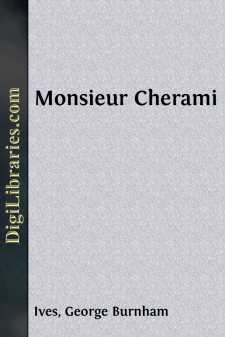Categories
- Antiques & Collectibles 13
- Architecture 36
- Art 48
- Bibles 22
- Biography & Autobiography 813
- Body, Mind & Spirit 141
- Business & Economics 28
- Children's Books 12
- Children's Fiction 9
- Computers 4
- Cooking 94
- Crafts & Hobbies 4
- Drama 346
- Education 46
- Family & Relationships 57
- Fiction 11826
- Games 19
- Gardening 17
- Health & Fitness 34
- History 1377
- House & Home 1
- Humor 147
- Juvenile Fiction 1873
- Juvenile Nonfiction 202
- Language Arts & Disciplines 88
- Law 16
- Literary Collections 686
- Literary Criticism 179
- Mathematics 13
- Medical 41
- Music 40
- Nature 179
- Non-Classifiable 1768
- Performing Arts 7
- Periodicals 1453
- Philosophy 64
- Photography 2
- Poetry 896
- Political Science 203
- Psychology 42
- Reference 154
- Religion 513
- Science 126
- Self-Help 83
- Social Science 81
- Sports & Recreation 34
- Study Aids 3
- Technology & Engineering 59
- Transportation 23
- Travel 463
- True Crime 29
The Devil's Pool
Description:
Excerpt
I
A la sueur de ton visaigeTu gagnerois ta pauvre vie,
Après long travail et usaige,
Voicy lamortqui te convie.
The quatrain in old French written below one of Holbein's pictures is profoundly sad in its simplicity. The engraving represents a ploughman driving his plough through a field. A vast expanse of country stretches away in the distance, with some poor cabins here and there; the sun is setting behind the hill. It is the close of a hard day's work. The peasant is a short, thick-set man, old, and clothed in rags. The four horses that he urges forward are thin and gaunt; the ploughshare is buried in rough, unyielding soil. A single figure is joyous and alert in that scene of sweat and toil. It is a fantastic personage, a skeleton armed with a whip, who runs in the furrow beside the terrified horses and belabors them, thus serving the old husbandman as ploughboy. This spectre, which Holbein has introduced allegorically in the succession of philosophical and religious subjects, at once lugubrious and burlesque, entitled the Dance of Death, is Death itself.
In that collection, or rather in that great book, in which Death, playing his part on every page, is the connecting link and the dominant thought, Holbein has marshalled sovereigns, pontiffs, lovers, gamblers, drunkards, nuns, courtesans, brigands, paupers, soldiers, monks, Jews, travellers, the whole world of his day and of ours; and everywhere the spectre of Death mocks and threatens and triumphs. From a single picture only, is it absent. It is that one in which Lazarus, the poor man, lying on a dunghill at the rich man's door, declares that he does not fear Death, doubtless because he has nothing to lose and his life is premature death.
Is that stoicist idea of the half-pagan Christianity of the Renaissance very comforting, and do devout souls find consolation therein? The ambitious man, the rascal, the tyrant, the rake, all those haughty sinners who abuse life, and whom Death holds by the hair, are destined to be punished, without doubt; but are the blind man, the beggar, the madman, the poor peasant, recompensed for their long life of misery by the single reflection that death is not an evil for them? No! An implacable melancholy, a ghastly fatality, overshadows the artist's work. It resembles a bitter imprecation upon the fate of mankind.
There truly do we find the grievous satire, the truthful picture of the society Holbein had under his eyes. Crime and misfortune, those are what impressed him; but what shall we depict, we artists of another age? Shall we seek in the thought of death the reward of mankind in the present day? Shall we invoke it as the punishment of injustice and the guerdon of suffering?
No, we have no longer to deal with Death, but with Life. We no longer believe either in the nothingness of the tomb or in salvation purchased by obligatory renunciation; we want life to be good because we want it to be fruitful. Lazarus must leave his dunghill, so that the poor may no longer rejoice at the death of the rich....



